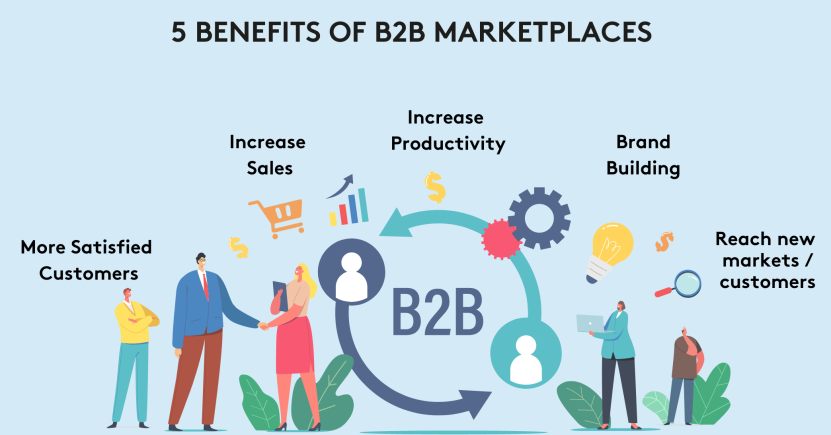B2B Win Login: The Key to Unlocking Marketplace Success

Winning in B2B ecommerce isn’t just about having a great product—it’s about seamless access and scalability. Marketplaces are redefining the way businesses buy and sell, making the right login strategy a crucial competitive edge.
B2B (business to business) eCommerce marketplaces have rapidly grown in popularity thanks to how they are effectively helping companies grow. Forrester reports that the B2B eCommerce market will reach around $1.8 trillion in the United States by next year, accounting for 17% of all B2B sales.
Below we explain in detail what B2B marketplaces are, how they can help your business grow, and what you need to know to select the best platform for your company.
Key Takeaways
- N.America B2B eCommerce is projected to expand at a compound annual growth rate (CAGR) of 19.7% from 2022 to 2030.
- B2B eCommerce helps companies expand their reach and increase revenue.
- B2B marketplaces are popping everywhere but your need to create a criteria list to select the right one for your business.
- Personalization is the primary guiding principle you should follow to maximize ROI potential.
- Your payment, delivery and language options can set you apart from competition.
Key takeaways
- B2B eCommerce Growth: The North American B2B eCommerce market is projected to grow at a CAGR of 19.7% from 2022 to 2030, reaching $1.8 trillion by next year.
- Marketplaces Expand Business Reach: B2B marketplaces help businesses expand their customer base, increase revenue, and streamline procurement.
- Choosing the Right Platform: Selecting the best marketplace requires a clear criteria list, considering factors like payment, delivery, and language options.
- Personalization Drives Success: Customization, customer-specific pricing, loyalty discounts, and prioritized shipping enhance ROI and set businesses apart.
On this page:
What is a B2B eCommerce marketplace?
A B2B eCommerce marketplace is where two business entities carry out their business transactions. For manufacturers, this can mean purchasing raw materials in bulk. Or, if you’re a wholesaler, it means buying large quantities of the goods to resell to retailers. Alibaba, Global Sources, and Amazon Business are examples of a B2B eCommerce marketplace.
Given businesses have different needs than individual consumers. Businesses identify the products they need, research different sellers, and buy directly from their chosen supplier online.
Why are B2B marketplaces increasingly popular?
As the Forrester report points out, B2B eCommerce marketplace revenue grows year after year. Alibaba’s incredible growth is clear evidence of the momentum we’re seeing in this space right now. As of 2020, the platform has more than 800 million annual users, accounting for 43% of total eCommerce sales in China. With so many businesses doing their buying and selling online, it’s safe to say that to remain competitive, companies need to sell their products online.

The forces at play here are the same in just about every corner of business: globalization and digitalization. eCommerce marketplaces modernize the sales process, allowing companies worldwide to do business together online.
With the growing popularity of B2B marketplaces, some distributors are launching their own platforms to showcase their products. Making sure these B2B eCommerce platforms are simple and user-friendly is essential for companies to succeed in this space.
- Product discovery: Buyers can now research an abundance of sellers online, helping companies find products more efficiently.
- Content quality and data accuracy: Because order volume is so large for businesses, these are good content, and data is vital in the B2B segment. Most B2B buyers use several information channels before landing on a seller. Because sellers are vetted before they can list on the marketplaces, buyers can feel confident in their decision. Marketplaces often provide data that help buyers decide, and they streamline procurement with digital processes for RFPs and RFIs, contract negotiation, purchasing, and invoicing.
- Finding new customers: As we have just established, finding and buying products for a company is challenging. However, securing B2B sales is no simple feat either. They must discover buyers, negotiate, establish mutually beneficial contracts and terms, and manage invoices and inventory. By selling on B2B marketplaces that align with a business’s brand statement and goals, companies can tap into a more extensive customer base and benefit from the platform’s more significant marketing efforts and brand reputation.
- Greater revenue: Beyond just reaching a broader audience, marketplaces allow businesses to work together to streamline their supply chains and produce more substantial financial results with increased profitability. And as the number of vertical marketplaces grows, B2B sellers have a tremendous opportunity to find new sales channels focused on delivering high-quality customer experiences.
- Buying habits: Just like consumer shopping, B2B buyers enjoy being able to research product options online. Whereas before, they had to call sales partners at other companies or use a dedicated, proprietary portal, they can now look for products on the marketplace.
Benefits of using a B2B marketplace
B2B marketplaces wouldn’t be experiencing such tremendous growth if they weren’t proving useful for buyers and sellers. They’re becoming the hotbed for business-to-business procurement because B2B buyers have followed a similar arc as consumers. They believe making purchases for their company should be as simple and transparent as when they shop online for themselves.
In the past, B2B sales were conducted through one-on-one relationships between buyers and sales representatives at sellers. And while that’s still the case for many companies, B2B eCommerce marketplaces help sellers facilitate customer relationships while streaming transactions and sales.

B2B eCommerce marketplaces provide additional advantages, including:
- Reach new markets and customers : Not only does a digital marketplace streamline the procurement process, it also expands your market reach. Since you don’t have to rely on your sales team to find and close every deal, you can reach more businesses at all hours of the day. Buyers and sellers alike benefit from the convenience of 24/7 access to online marketplaces.
- Increase Sales: Beyond just reaching a broader audience, marketplaces allow businesses to work together to streamline their supply chains and produce more substantial financial results with increased profitability. And as the number of vertical marketplaces grows, B2B sellers have a tremendous opportunity to find new sales channels focused on delivering high-quality customer experiences. By creating a rich product portfolio, with optimized descriptions and ensuring a 5 stars customer service, you can set yourself up for success.
- Increase Productivity: Your company’s offering on the b2b marketplace means you can have a sales representative 24/7 and around the globe. Online self-service options for customers mean you don’t have to build your sales staff continually. Instead, you can optimize staffing costs for research, procurement, and sales relationship management and free up your existing sales staff to help with new business developments and analyze data. The data you capture through your platform will help you understand customer service costs.
- Brand Building: Listing your products online raises your company’s visibility. Building an SEO-friendly marketplace or writing good product descriptions will help online buyers find your company before others. You will also benefit from the platform’s more significant marketing efforts and brand reputation.
- More Satisfied Customers: It doesn’t matter if you’re a B2C or B2B company; omnichannel is now the name of the game. Integrating channels and ensuring the customer experience is seamless no matter where they’re shopping is vital to customer satisfaction. When executed correctly, digital platforms provide cross-channel consistency and improve the shopping experience overall.
What features to look for in B2B eCommerce Marketplace
eCommerce marketplaces are complex environments designed to facilitate seamless transactions between businesses. Many great multivendor options are available if you’re not ready to build your proprietary digital storefront. Before you decide which one to use, ask whether or not they can answer the following questions:
Does it offer various payment gateways? Any good salesperson must be able to sympathize with potential customers. Using an online marketplace is no different. You need to offer multiple payment methods, whether credit cards, cash-on-delivery, e-wallets, or, in some cases, cryptocurrencies. It may seem obvious, but this is a critical capability you won’t want to overlook.
What are the product management features? You need a reliable product catalog management system if you sell online. Customers shop across different channels, and you must ensure your product data is consistent across all channels, including updated product descriptions, inventory status, and high-resolution images.
In that vein, you should allow your customers to review products on your site. Many buyers consider reviews essential to their research and will pass on purchasing a product with little customer feedback. You’ll want to confirm with a potential eCommerce platform they have this capability as it is essential to promoting your brand’s value.
Does it have multilingual and multi-currency capabilities? If part of the beauty of an eCommerce marketplace is that you can tap new markets, you need to deliver a good customer experience to businesses worldwide. Allowing customs to shop in your store in their language of voice is essential for doing business. It shows customers you’re interested in reaching a more diverse customer base and are capable of meeting their needs. It’s the same with currency; your marketplace should have integrations that allow businesses to shop using any of the national currencies.
Does it offer warehouse management? The best eCommerce platforms offer warehouse management, making managing inventory tracking or stock locations easy. You should also look for an option to include all your warehouse locations if you have more than one. This way, you can assign the closes warehouses to customer orders fasters.
Creating your own B2B eCommerce marketplace
Knowing your target audience is perhaps the most crucial part of setting up an online storefront. It will inform all your subsequent operations, from product development to marketing. If you would prefer to build a branded digital marketplace for your business, personalization is the primary guiding principle you should follow to maximize ROI potential.
Couple the following points with those from the previous section to create the best, most personalized customer experience:
Prioritize quality content: Customers need help navigating the purchasing process. Content is critical in how they research products and ultimately decide to buy. Do your best to customize content to meet clients’ unique needs and create better quality leads.
Efficiencies for expert users: Expert users of your B2B eCommerce website may prioritize being able to purchase what they need quickly. They may not be interested in everything a catalog has to offer. To help with this, companies can provide quick ordering with SKUs or personalized catalogs.
Customer-specific pricing: As with every business, pricing is the most significant consideration for the buyer during the procurement process. A good marketplace has variable prices depending on the consumer, the bundle, or the total amount of products purchased.
Loyalty discounts: If you have customers who have bought from you for a long time, it’s good to offer them special incentives periodically. For example, you can provide discounts to customers who have shopped with you for a year or more while giving new clients the standard pricing.
Prioritized shipping: With supply chain instability impacting businesses and consumers worldwide in recent years, shipping and logistics are critical to your success. You must ensure product availability, delivery options, and timing are up to date and communicated to each unique customer.
Search and navigation: Personalized search functionality will help B2B buyers quickly find the products they want while discovering additional supplies for their business needs.
Core dna can help you start a B2B marketplace before your competition. We offer eCommerce with a headless, hybrid, or decoupled customer management system. With our unique integrations and automation, we can create anything a prospective B2B business desires. Interested? Read more below 👇













